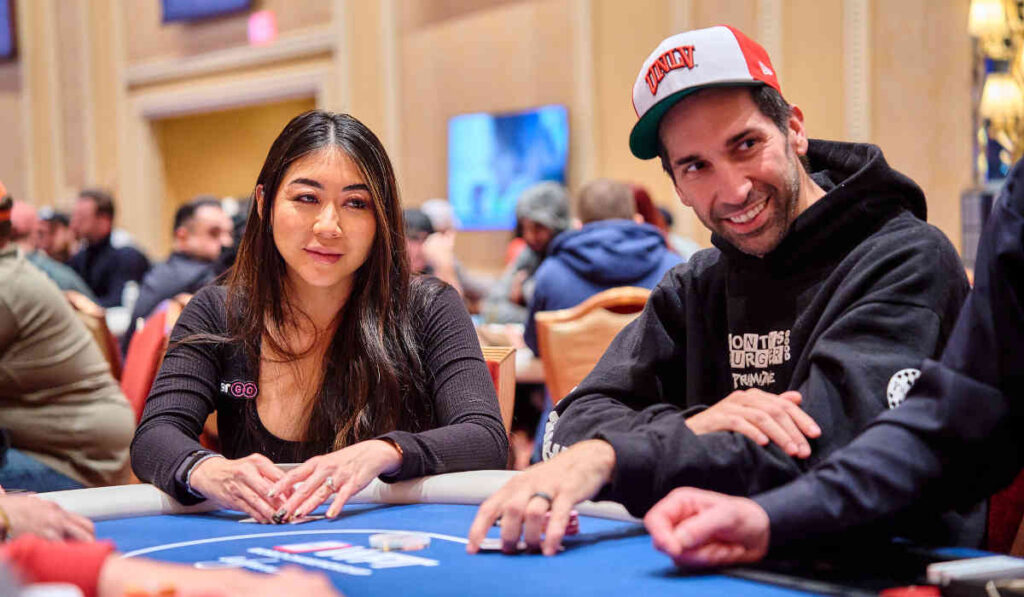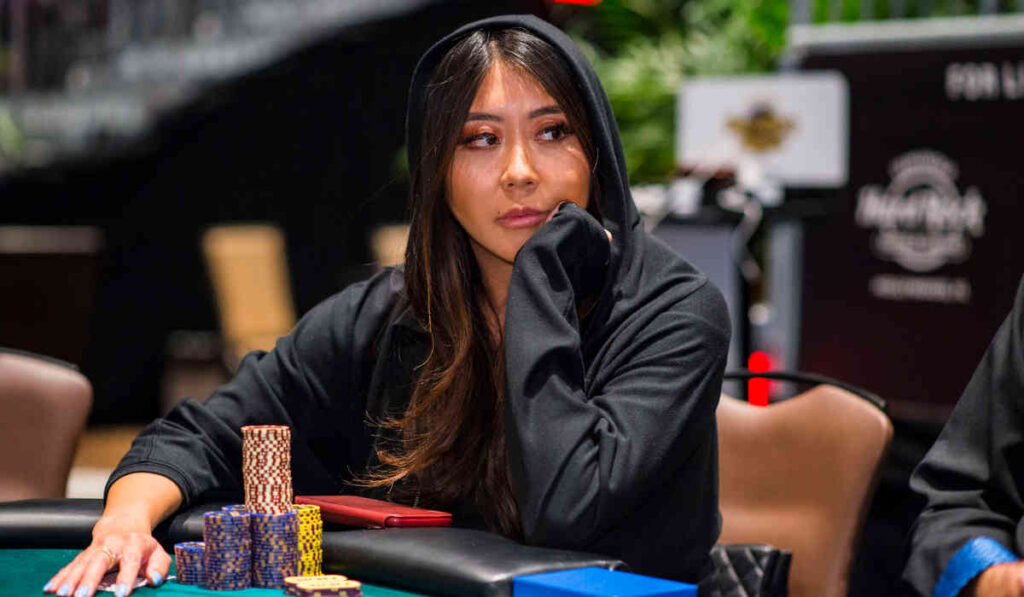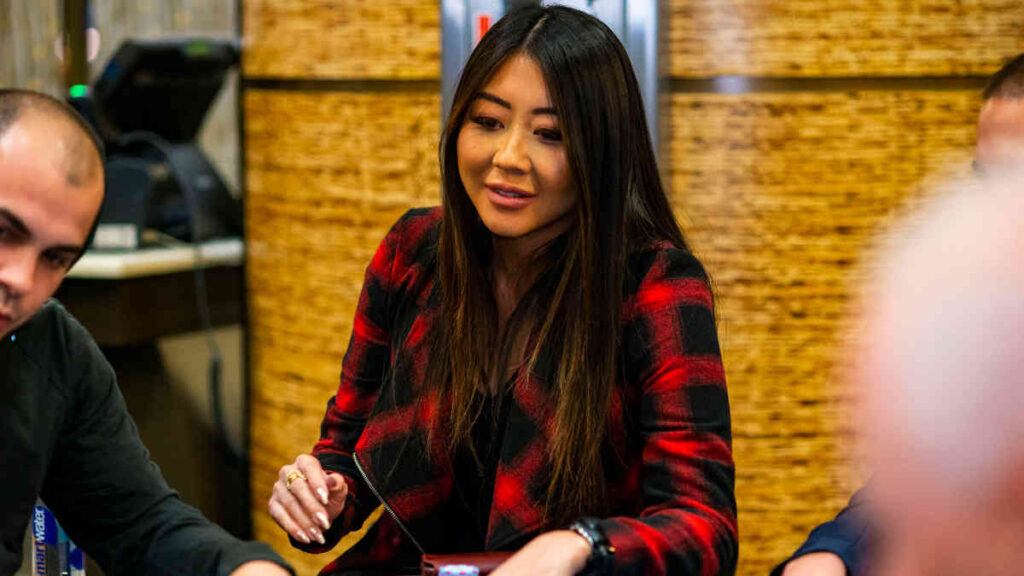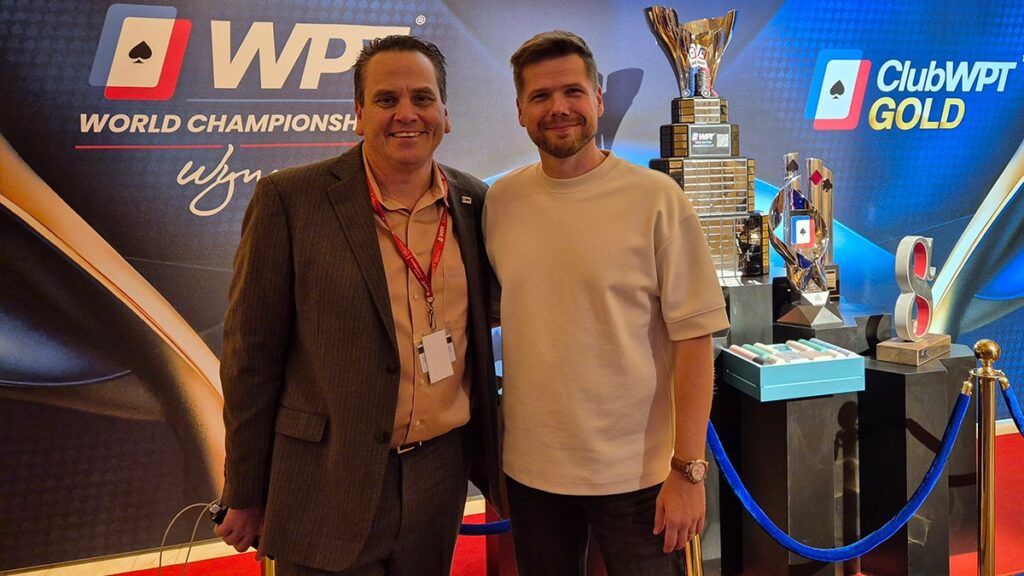Images courtesy of World Poker Tour
A force at the table and a standout in the booth, Maria Ho has become one of poker’s most respected and recognizable figures. With millions in earnings and a Poker Hall of Fame nod, she’s built a legacy defined by grit, grace, and game.
Whether she’s deep in a high-stakes run or delivering sharp analyses to audiences worldwide, Maria brings clarity, confidence, and heart to everything she touches. Her presence has elevated the game—and inspired a new generation along the way.
In this edition of Between the Blinds, Maria reflects on her path through poker, the hurdles she’s faced, and the drive that keeps her breaking new ground.
Do you remember your first time playing? If so, what was it like?
I first played poker in college. A group of guy friends who lived next door would host these secret Friday night games. One night, I showed up uninvited—with a keg of beer—and was instantly welcomed in.
That night turned out to be a poker night, with no other women at the table. They taught me the basics, and I immediately connected with the game. I’d always enjoyed card games; growing up, I played bridge, so the combination of strategy and competition instantly hooked me.
What’s something you wish you were told when you started playing?
I wish someone had told me just how much discipline poker demands and how challenging the lifestyle can be. I also wish people had talked to me about the pitfalls of poker instead of the unrealistic and glamorized view of what it is like to be a professional poker player.
People often see the glamorized version of poker on TV or social media, but the reality is that many players struggle with bankroll management and long downswings.
When you’re your own boss, it’s easy to get reckless. I try to share the less glamorous side of poker with newer players, because even recreational players benefit from understanding the game’s true nature.
What advice would you give to players about table etiquette and interacting with dealers and players?

Respect is everything. Dealer abuse is unacceptable, period. It’s irrational to blame dealers for your bad luck.
Respect also applies to how you treat fellow players. Compete hard, but win and lose with grace. There are unspoken rules at the table, and while new players may not know all of them, leading with kindness and common sense is always the right approach.
If you’re unsure, follow this principle: play tough, but be gentle with everything else.
Do you have any pre- or post-game rituals you practice?
Yes, definitely. Meditation is essential for me; it helps me to clear my head and maintain my ability to focus. I also like to do something active before long sessions, since I know I’ll be sitting for hours. Getting outside and into the sunlight is a great way to boost energy.
After a tough session, I don’t mind treating myself – Cane’s chicken is my go-to comfort food. It’s a small ritual that helps me decompress.
How did you celebrate one of your first or most memorable wins?
In 2011, I finished second in a $5K WSOP event and won over $800,000. It was my biggest score at the time. I didn’t go so far as to rent out an entire club, but I did reserve five or six tables and invited my close friends and loved ones to celebrate.
I picked up the tab for everyone. When I celebrate, I want it to be with the people who support me. It was a really fun and meaningful night.
If someone flashes their cards at you, do you tell them and/or use it to your advantage?

If I see someone isn’t protecting their hand, I’ll absolutely say something. The integrity of the game matters more than picking up an edge.
That said, there have been a few awkward situations. Some players have intentionally shown me their hand to try to get me to fold. I don’t want to win that way, and I’ll always speak up to let them know that’s not OK.
One time, I had kings, and a player literally kicked me under the table after I reraised them. Then they kicked me again when it was their turn to act.
It was pretty obvious they were signaling they had aces. I didn’t know for sure, but I didn’t want to change my decision based on unethical information. I still shoved. They had aces. I lost. But I played it straight.
How, if at all, does having such a big social media following affect your play?
These days, not much. But early on, especially when live poker streams were newer, it definitely got in my head a bit. People would comment on my hands without understanding the full context – things like table dynamics or earlier interactions that happened before the stream started.
I’ve learned to tune out that noise. What people say online is often different from what they’d do in real life at the table. Now, I can take it on the chin. I’m not afraid to engage, even with criticism, but I don’t let it affect how I play.
What’s it like to be one of the most well-known—if not the most well-known—women in poker?
It’s humbling. I never set out to be the “face” of anything, but I’m grateful my journey in poker led me here.
If someone wants a photo or to meet me, I’m always flattered. But I also recognize the responsibility that comes with having a platform. I want to use it to promote poker in a positive, welcoming way and give back to the game that’s given me so much.
I had no idea until someone pointed it out, but my cashes this summer put me at the top of the @gpi #WSOP Women All Time Money List! I’m still as hungry as ever and excited to keep building on this in the coming years. pic.twitter.com/6BSqAJ7NDO
— Maria Ho (@MariaHo) October 7, 2024
What was it like getting inducted into the Hall of Fame for poker and being an award-winning TV broadcaster and commentator?
Getting inducted into the Hall of Fall for Poker is probably the greatest honor of my career. What makes it so meaningful is that the people voting are my peers, the ones who understand the grind, the game, and the sacrifices it takes.
When I started, poker wasn’t something my parents supported. It wasn’t a “real” career in their eyes. To have that formal recognition meant the world. It validated the years I’ve put in and showed that the work wasn’t in vain.
Broadcasting and commentating has been an awesome journey. Broadcasting didn’t come naturally to me; it took a lot of practice and growth, just like poker did.
You don’t always get immediate feedback, so you hope your commentary connects with people. It’s been rewarding to hear that viewers are learning from what I say or enjoying how I break down poker hands.
What’s cool is that broadcasting has helped me grow as a player too. Saying my thoughts out loud gave me new perspectives on the game I’d otherwise just internalize. It’s made me a better analyst and a better competitor.
Anything else you’d like to share?
I want to encourage more people, especially women, to take that first step into poker. I’ve seen so many fall in love with the game once they try it.
Established players can help by making the environment welcoming and inclusive. What I love most about poker is the social aspect. Not everyone is playing to become a pro or win millions; sometimes it’s just about the experience.
So, let’s show up to the table ready to compete, but also ready to create a great atmosphere. It’s possible to be tough and kind at the same time.


